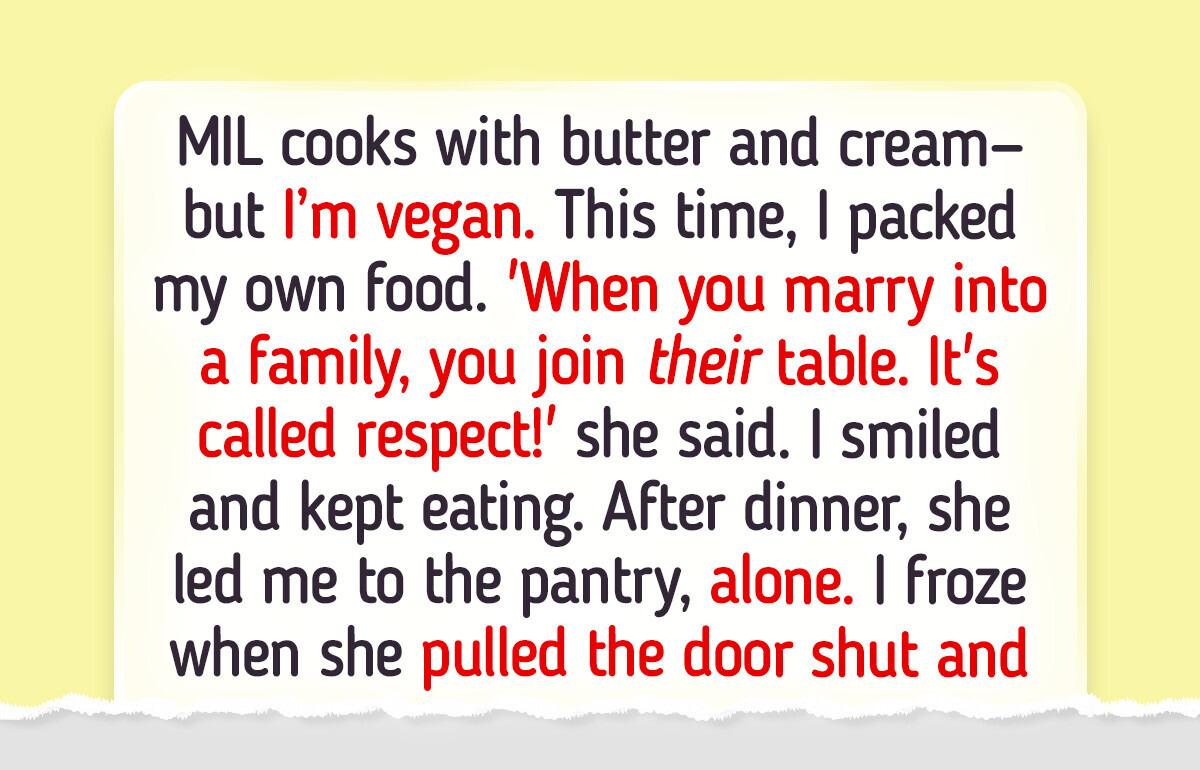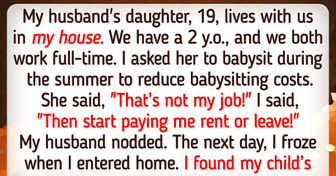My Fiancée Made Me Feel I’m Just Her Second Choice


Families can be complex, and the dinner table often becomes the stage where unspoken tensions quietly unfold. In-laws, expectations, and traditions—all of it can blend into something far more complicated than the food being served. Sometimes, it’s not just about what’s on the plate, but what lies beneath the surface: values, boundaries, and respect. Recently, we received a letter from a woman named Diana, who shared a quiet yet powerful experience that left her questioning where—and even if—she still belongs at her in-laws’ table.

Hi Bright Side,
My MIL cooks with butter and cream—but I’m vegan. I’ve tried to explain it gently, many times, but nothing ever changed.
This time, I packed my own food in a container. I didn’t make a fuss. I didn’t comment on the menu. No judgment. No preaching.
She saw me bringing it to the table. “When you marry into a family, you join their table. It's called respect!” she said in a tone that made the room still. I smiled politely and kept eating my food.
We got through the meal, though her end of the table stayed mostly silent. Everyone else made small talk, tried to act like nothing was wrong—but the air felt tight. Off. I felt it in my chest.
After dinner, while the others were still in the living room, she led me to the pantry, alone. I froze when she pulled the door shut and pointed to a shelf in the far corner. It was cleared and labeled in thick black marker: ‘DIANA’S SPECIAL DIET.’

On it sat a plastic bin. Inside: a roll of parchment paper, a half-used bottle of olive oil, and a single can of chickpeas.
She didn’t look at me at first. Just stared at the shelf like it was something perfectly reasonable. “I figured if you’re going to bring your own food,” she said, finally turning to me, “We might as well keep it separate. That way, it doesn’t contaminate the family meal.”
My mouth went dry. “And I’ll let everyone else know,” she added, calm and composed. “So no one gets confused or accidentally serves you something ‘offensive.’ Maybe next time we’ll just set a little tray at the end of the table. Or outside. If that makes you more comfortable.”
It wasn’t a tantrum. It wasn’t a fight. But it felt like exile. Not loud. Not cruel on the surface. But cold. Calculated. A message, sealed and delivered.
She made me deeply uncomfortable. Now I’m wondering if I should ever set foot at her dinner table again.
Sincerely,
Diana

Diana, navigating subtle hostility wrapped in politeness can be disorienting, especially when it comes from someone who holds power in a family—so here are 5 pieces of advice, each offering a different approach to help you reclaim your dignity, set boundaries, and decide what kind of presence you want in that dining room, if any at all.
Her table isn’t the only table.
Host your own meal. It doesn’t have to be a production—just a warm, generous invitation for family to join you. Make your food.
Show them vegan doesn’t mean “other.” If she comes, great. If she doesn’t, you’ve still shifted the dynamic: from “guest in her world” to “equal with her own space.”

Sometimes the softest voice can carry the deepest truths.
Write her a note. Not a confrontation, not a diary entry—just a calm, honest message that names what she did. Say how it made you feel, not to guilt her, but to invite her into your humanity. “I know we see food differently, but that moment in the pantry felt less like an offer and more like a line drawn.”
People rarely acknowledge the sharpness of their actions until they see the bruise it left behind.
When a room goes still, it tells you who’s watching.
Ask your partner—gently but directly—what they saw. Did they notice the silence? The edge in her voice? Then ask what they felt.
This isn’t about forcing a reaction, it’s about knowing whether you’re standing alone. Sometimes, the difference between surviving a family dynamic and changing it is having even one person say, “That wasn’t okay.”

Let’s call her bluff—politely.
If she invokes “respect” again, try this: smile and say, “I agree. Respect is so important. That’s why I didn’t make a fuss, didn’t push my choices on anyone, and quietly fed myself. I’m hoping for the same consideration in return.”
It puts the mirror up. It shows you’re not rejecting the family—you’re rejecting being diminished.
Your presence is not an obligation.
You are allowed to decline the next invitation. No drama, no excuses. Just, “We’re not available this time.” Absence, when chosen thoughtfully, can be louder than confrontation.
If anyone asks why, you don’t need to tell the pantry story. You can simply say, “I didn’t feel welcome last time, so I’m taking space.” Let that truth echo where it needs to.
Navigating office politics is rarely straightforward—particularly when ambition, competition, and personal struggles intersect. In this link, discover the gripping story of a woman who secretly recorded her colleague’s shocking behavior… only to learn that some revelations are better left in the dark.











